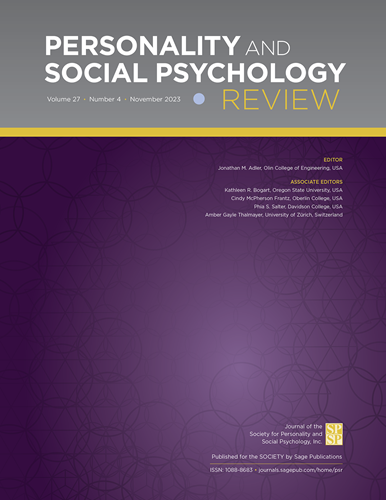When Social Hierarchy, Power, and Collective Autonomy Motivate Social Movement and Counter-Movement Mobilization Among Disadvantaged and Advantaged Groups
IF 10.4
1区 心理学
Q1 PSYCHOLOGY, SOCIAL
引用次数: 0
Abstract
What happens when disadvantaged group members try to gain power in an attempt to protect their collective autonomy? The present integrative review outlines dynamic social processes and conditions under which efforts to restrict a group’s collective autonomy motivate social movement mobilization among disadvantaged groups to challenge social hierarchies that limit their power. This, in turn, threatens advantaged groups’ perceptions of their access to power and, by extension, their sense of collective autonomy, motivating them to reaffirm the existing social hierarchy by mobilizing counter-movements. We propose a theoretical model, called the Movement Mobilization Model of Collective Autonomy, to articulate these dynamic processes by integrating sociological, psychological, and organizational science literatures. The model specifies the conditions under which social movements and counter-movements are activated, psychological processes that drive action, how they play off each other, and offer directions for future research.Public AbstractWhat happens when disadvantaged groups feel that their freedom to define and practice their collective identity (i.e., collective autonomy) is restricted? The present theoretical review outlines the conditions under which social inequality activates the feelings of collective autonomy restriction among disadvantaged group members and motivates the mobilization of social movements seeking social equality. As these social movements gain traction, advantaged group members may feel that their privileged position and collective autonomy are threatened. These feelings of threat and collective autonomy restriction among advantaged groups in turn motivate them to mobilize counter-movements that seek to protect social hierarchy and their privileged position within it. The process outlined in this case is relevant to individuals from both marginalized and privileged backgrounds, as it illustrates the different ways in which real-world power structures shape the way they experience and navigate social movements and counter-movements as they unfold in real time.当社会等级、权力和集体自治激发弱势群体和优势群体的社会运动和反运动动员
当弱势群体成员试图获得权力以保护他们的集体自主权时,会发生什么?本综合综述概述了动态的社会过程和条件,在这些过程和条件下,限制群体集体自治的努力激发了弱势群体的社会运动动员,以挑战限制其权力的社会等级制度。反过来,这又威胁到优势群体对自己获得权力的看法,进而威胁到他们的集体自治意识,促使他们通过动员反运动来重申现有的社会等级制度。我们提出了一个理论模型,称为集体自治的运动动员模型,通过整合社会学,心理学和组织科学文献来阐明这些动态过程。该模型详细说明了社会运动和反运动被激活的条件,驱动行动的心理过程,它们是如何相互影响的,并为未来的研究提供了方向。当弱势群体感到他们定义和实践集体身份的自由(即集体自治)受到限制时,会发生什么?本理论综述概述了社会不平等激活弱势群体成员集体自治限制的感觉并激发寻求社会平等的社会运动的动员的条件。随着这些社会运动获得动力,优势群体成员可能会感到他们的特权地位和集体自主权受到威胁。优势群体的这种威胁感和集体自治限制反过来又激励他们动员反运动,寻求保护社会等级和他们在其中的特权地位。本案例中概述的过程与来自边缘和特权背景的个人相关,因为它说明了现实世界权力结构塑造他们体验和驾驭社会运动和反运动的不同方式,因为它们在实时展开。
本文章由计算机程序翻译,如有差异,请以英文原文为准。
求助全文
约1分钟内获得全文
求助全文
来源期刊

Personality and Social Psychology Review
PSYCHOLOGY, SOCIAL-
CiteScore
19.00
自引率
1.90%
发文量
20
期刊介绍:
Title: Personality and Social Psychology Review (PSPR)
Journal Overview:
Official journal of SPSP, the Society for Personality and Social Psychology, Inc.
Premiere outlet for original theoretical papers and conceptual review articles in all areas of personality and social psychology
Features stimulating conceptual pieces identifying new research directions and comprehensive review papers providing integrative frameworks for existing theory and research programs
Topics Covered:
Attitudes and Social Cognition: Examines the inner workings of the human mind in understanding, evaluating, and responding to the social environment
Interpersonal and Group Processes: Explores patterns of interaction and interdependence characterizing everyday human functioning
Intergroup Relations: Investigates determinants of prejudice, conflict, cooperation, and harmonious relationships between social groups
Personality and Individual Differences: Focuses on causes, assessment, structures, and processes giving rise to human variation
Biological and Cultural Influences: Studies the biological and cultural mediation of social psychological and personality processes
 求助内容:
求助内容: 应助结果提醒方式:
应助结果提醒方式:


